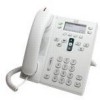Cisco 6941 Administration Guide - Page 72
Configuring Startup Network Settings, Configuring Security on the Cisco Unified IP Phone - phones set date and time
 |
UPC - 882658277801
View all Cisco 6941 manuals
Add to My Manuals
Save this manual to your list of manuals |
Page 72 highlights
Configuring Startup Network Settings Chapter Table 3-2 LED Diagnostic Status Hardware Test Power is Ready Flash is Accessible RAM Test Successful Ethernet Test Successful MWI On - - - Hold On On - - Mute On On On - Speaker On On On On 2. The screen displays the Cisco Systems, Inc., logo screen. 3. These messages appear as the phone starts up. - Phone not registered 4. The home screen displays: - Current date and time - Primary directory number - Additional directory numbers and speed dial numbers, if configured (Only on Cisco Unified IP Phone 6961) - Softkeys If the phone successfully passes through these stages, it has started up properly. If the phone does not start up properly, see the "Resolving Startup Problems" section on page 9-1. Configuring Startup Network Settings If you are not using DHCP in your network, you must configure these network settings on the Cisco Unified IP Phone after installing the phone on the network: • IP address • IP subnet information • TFTP server IP address • You also may configure the domain name and the DNS server settings, if necessary. Collect this information and see the instructions in Chapter 4, "Configuring Settings on the Cisco Unified IP Phone." Configuring Security on the Cisco Unified IP Phone The security features protect against several threats, including threats to the identity of the phone and to data. These features establish and maintain secure communication streams between the phone and the Cisco Unified Communications Manager server, and digitally sign files before they are delivered. For more information about the security features, see the "Understanding Security Features for Cisco Unified IP Phones" section on page 1-14. Also, refer to Cisco Unified Communications Manager Security Guide. You can initiate the installation of an LSC from the Security Configuration menu on the phone. This menu also lets you update or remove an LSC. 3-16 Cisco Unified IP Phone 6921, 6941, 6945, and 6961 Administration Guide for Cisco Unified Communications Manager 8.5 (SCCP and SIP) OL-23769-01















